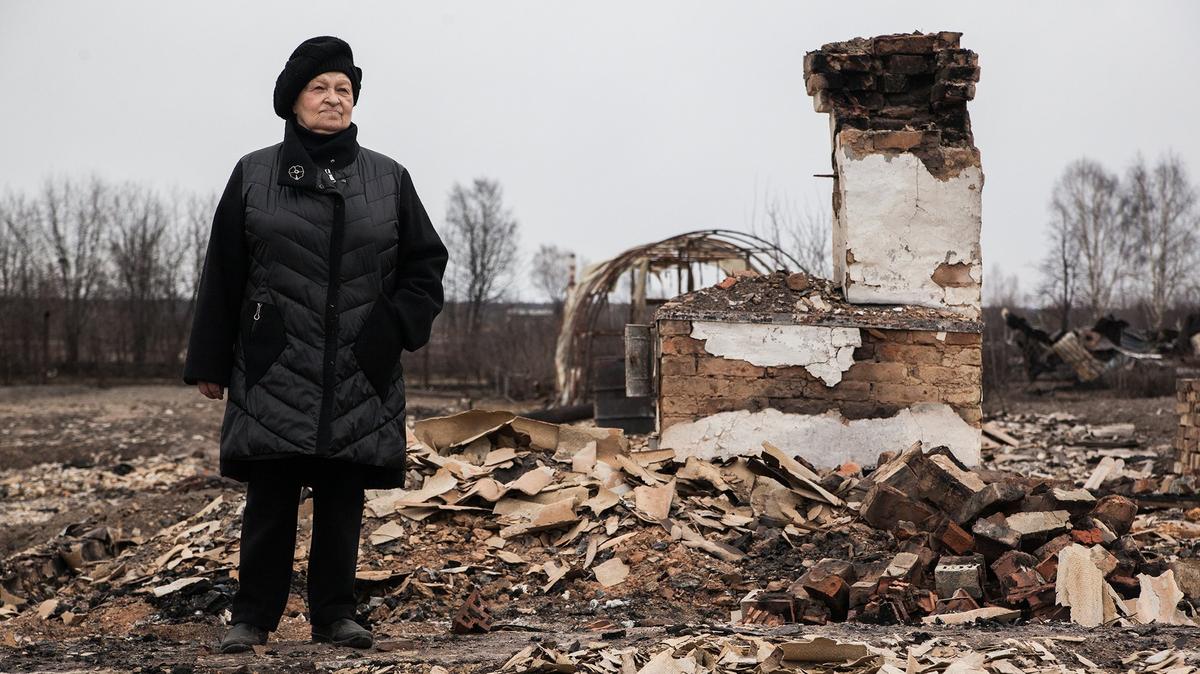This article was originally published together with Kedr.media.
In the afternoon of 25 April, sawmill workers were burning waste on the outskirts of Sosva, a village in Russia’s Yekaterinburg region — yet again neglecting fire regulations.
The weather was very windy that day: the sparks spread to the residential areas quickly. The fire destroyed 130 detached houses, a penitentiary facility, and two sawmills in just half a day. Two people were killed, 659 lost their homes, and many also lost their jobs.
Fires have always been commonplace in Sosva, but this particular one turned the townsfolk’s life completely upside down.
Sosva’s economic mainstay, a penitentiary for prisoners with tuberculosis, fell victim to the flames.
The beloved job
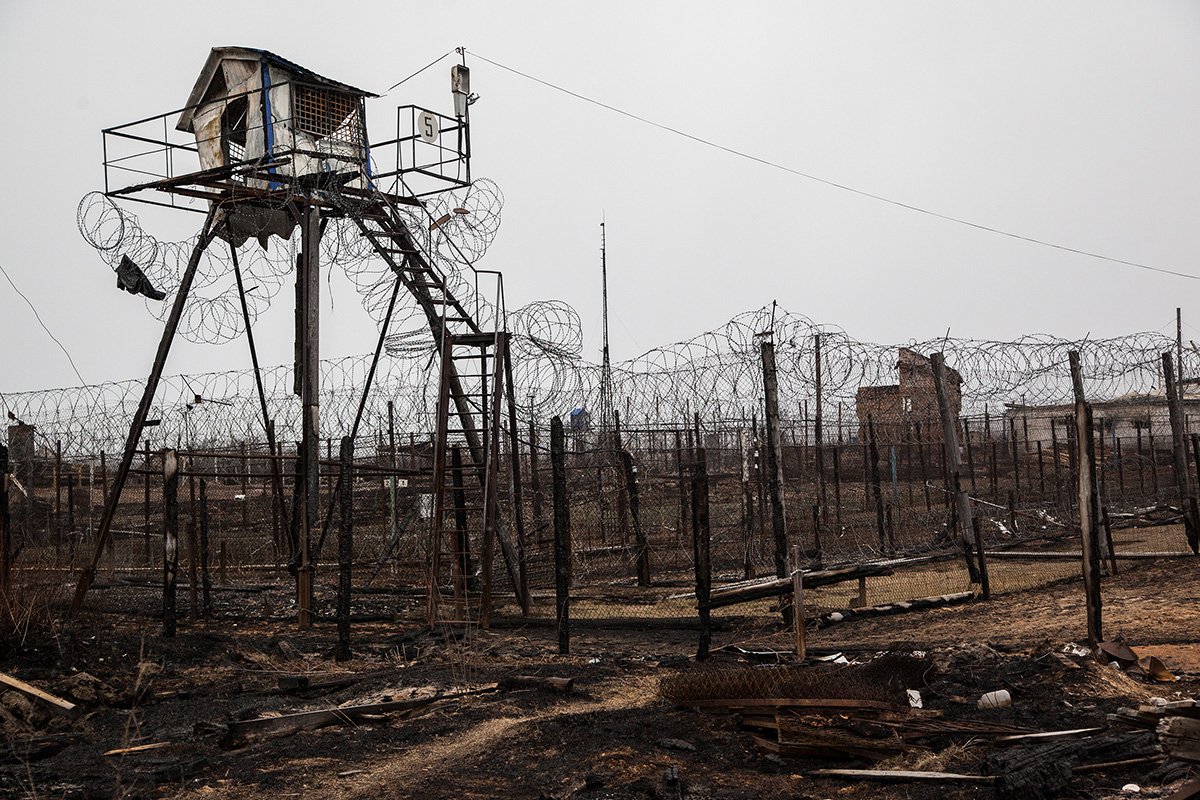
A tower in Sosva’s prison for convicts with tuberculosis. Photo: Nikolay Kozhevnikov, exclusively for Novaya Gazeta Europe
The locality of Sosva is a six-hour drive from Yekaterinburg and is home to seven thousand people. The Sosva River that flows through it has delicious herring: Joseph Stalin used to love it, and rumour has it he had it delivered to Moscow in barrels every now and then. Allegedly, Stalin even offered Winston Churchill to try the Sosva herring during the 1945 Yalta Conference. The British Prime Minister was reportedly delighted by the taste.
Sosva has a reputation of a “prison settlement”, which traces back to Stalin era: about 20 prisons were built in Sosva and around it during the Soviet era.
The prison colony here is a pivotal enterprise as it provides jobs to most of the villagers, and pretty high-paying by local standards: 30,000 to 50,000 rubles (€350–580) a month. Apart from the penitentiary, the only job opportunity for a Sosva resident is working at any of the 12 sawmills that used to operate here prior to the fire. But that kind of job is way more difficult.
Back in the day, Sosva used to have three prison colonies, but the only working correctional facility now is the local prison for convicts with tuberculosis. That prison was Sosva’s lifeline.
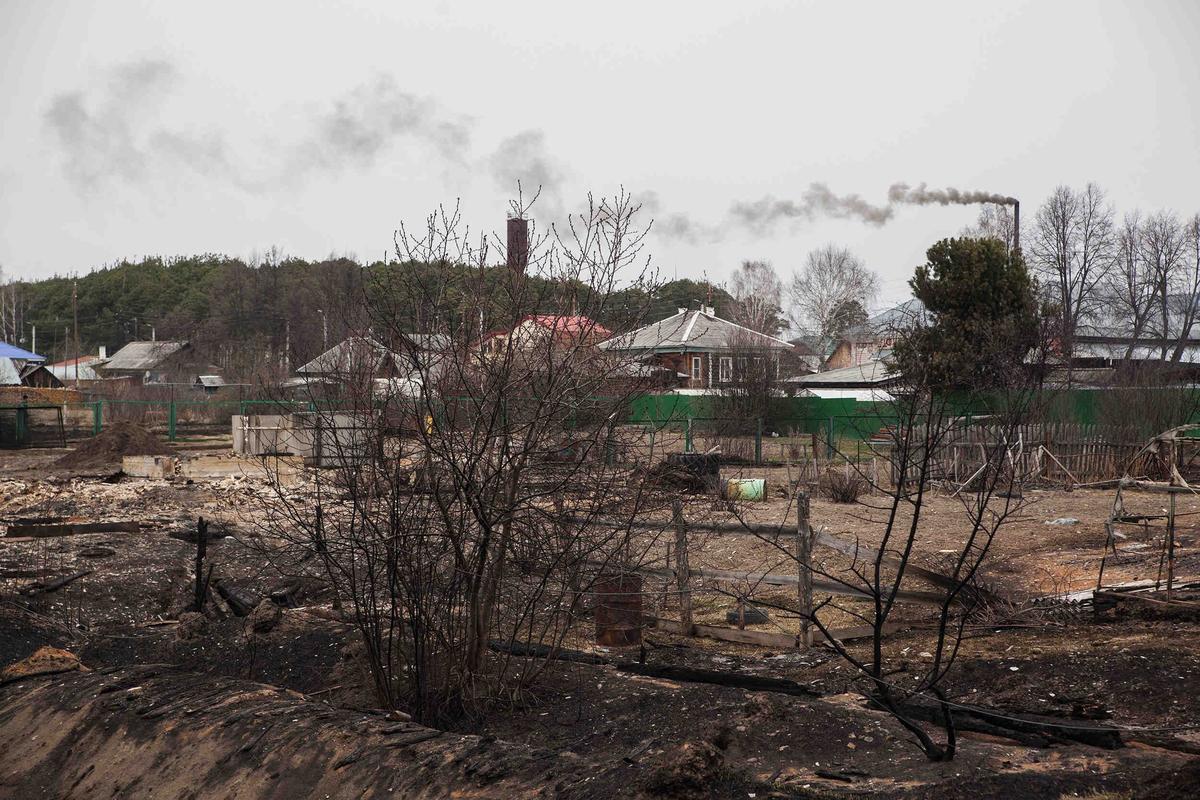
Sosva. Photo: Nikolay Kozhevnikov, exclusively for Novaya Gazeta Europe
Locals still speak of the burnt-down colony in the present tense as if it was still here, the provider for the whole settlement.
Lyubov Parshina, 49, a prison shop cashier, says: “Unlike in many other Russian prisons, there’s no nasty stuff in ours. Everyone needs a job, we don’t want any trouble.” The prison shop, she says, has “a supermarket selection”: it even sold oranges and kiwifruit.
Job tenure of the penitentiary personnel goes fifty percent faster than in other places, which is why many of the people who work in prisons retire at the age of 35 or 40. However, they usually find employment in the prison colony after they retire. Those who have served 12.5 years in the system may get in line for a housing certificate.
Young people here get themselves a job in the prison, hoping to use this certificate in the future and leave the village for good. But many end up settling down and building houses in Sosva: their children are growing up, and their parents are ageing. Some people manage to move to Serov, the closest large city, or Yekaterinburg, though.
Lyubov says sometimes the colony’s personnel catch TB from the prisoners. In this case, they get back to work once they recover. Viktor Semyonov, the colony’s dentist, had a tuberoma removed from his lungs four times.
“I love my job,” says Elena Matveeva, 51, a nurse at the colony’s hospital. “We give injections, treat people, they recover, so we help them. Everyone in the town loves what we do. Everyone likes it. No, there is nothing dreary about this place.”
The hospital’s personnel used to receive some bonus wages for working with tuberculosis patients back in the day, but now those have been cut, the nurse says.
“They said a person might catch TB anywhere, so now we have the same salary as doctors in civilian hospitals.”
Prisoners here are mostly involved in logging and wood processing. They make racks for goods transportation, benches, and tables.
Water issues
Every time Natalya Shcherbina, a 49-year-old engineer, has to flush her toilet, she needs to go downstairs to the well — “it’s just 30 metres away, it’s very close, many people need to walk way longer” — and drags a bucket of water to the second floor of the barracks she resides in.
“You can just pour this water into the toilet tank, but that would not do, and you’ll need to walk downstairs once more,” she says. “So, we flush the toilet using a water scoop”.
Natalya works at a power substation in the neighbouring village of Koshay. She met her future husband when she was 20, and moved into his house in Sosva.
“I liked it,” she says. “It took me some time, but I got used to it, and then I liked it.”
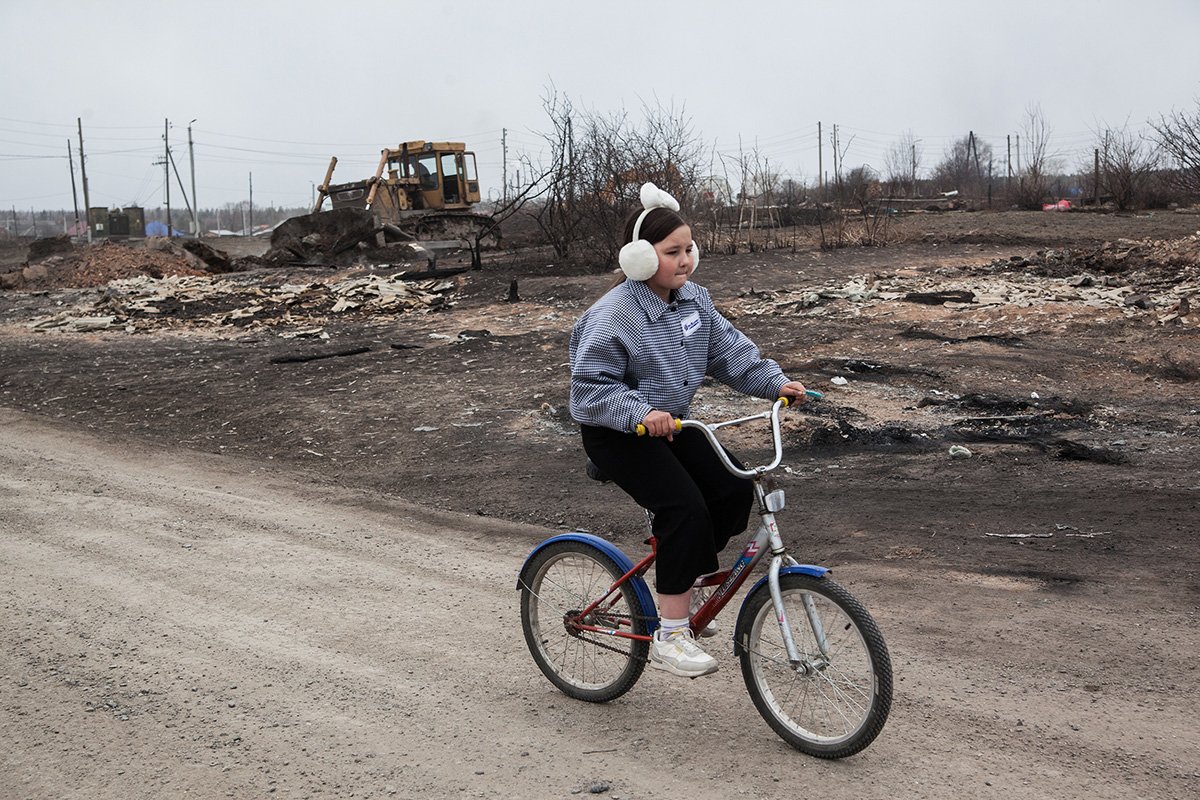
Sosva. Photo: Nikolay Kozhevnikov, exclusively for Novaya Gazeta Europe
Dmitry fell sick in 2021, and suffered from unbearable pains for a long time. His wife was near him all the time, sobbing her heart out, but could not save him. He had cancer. The local doctors misdiagnosed him at first; when they figured things out, it was too late, and he died before long.
Natalya lives in a neighbourhood of two-storey barracks where the security personnel of the prison used to reside in the 1940s. Sosva’s administration refers to apartments in these houses as “partly well-equipped”.
“The only amenity I have is sewerage,” Shcherbina says.
In order to make themselves warm, locals stock up on firewood: every apartment has a stove.
There are about 50 of such “partly well-equipped” houses in Sosva, and each lacks bathrooms or water supply.
The settlement has zero public bathhouses or launderettes. This is why locals build small bathhouses in their yards.
Shcherbina’s bunkhouse only managed to stay away from the fire because the wind died down. But the bathhouse in her yard succumbed to the flames.
There were many swamps around Sosva back in the day, but they have all run dry by now. Snow melts completely by April in this area, and rains are quite rare as well. These are natural factors that increase the risk of a fire.
“In recent years, we’ve been afraid of a potential fire starting since April,” Natalya says.
Many wells in the village have run dry. Perhaps if Sosva had adequate water supply, people would have managed to defend some of the houses from the fire.
The regional government was so generous a few years back that they built several three-storey brick houses in Sosva for the region’s orphans. The houses were even equipped with central heating and water supply. However, the water coming from the tap is rusty, so it is unfit for both drinking and washing clothes.
But the main thing is that there are no jobs in Sosva. Many orphans abandoned their apartments as they were unable to find themselves a job, Natalya says.
Through a glass
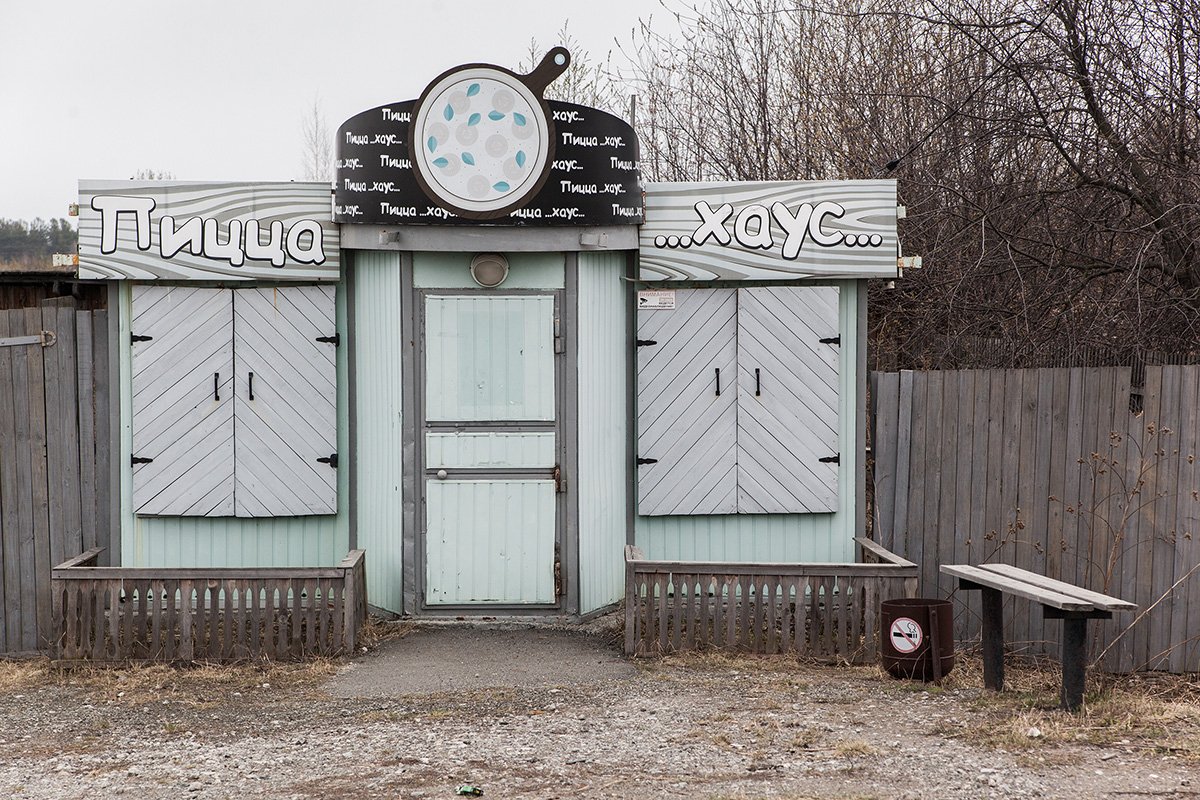
Sosva. Photo: Nikolay Kozhevnikov, exclusively for Novaya Gazeta Europe
Beside a wooden kiosk with “Pizza house” written on it is a trash can. On the can, there is a sign: a crossed-out cigarette butt. Locals do not violate the restriction and never throw cigarette butts into the trash can: they throw them nearby, on the dry grass that grows along the road.
This dry grass here is several feet high. Near each house, there is firewood, wood bars, or shavings lying on the ground. Empty vodka bottles are scattered all over the town. Sometimes sun beams go through the glass and set the dry grass on fire: this is how many fires started here.
Many Sosva’s residents lost their houses to fire more than once or twice in their lifetime.
***
Local sawmill workers are obliged to dispose of sawdust, shavings, and other timber residues. The safety regulations say they need to bring those to a local boiler station or burn those at dedicated sites, and then douse the ashes with water.
However, the owners of the sawmills do not bother with safety. They instruct their employees to burn the residues within the village’s limits.
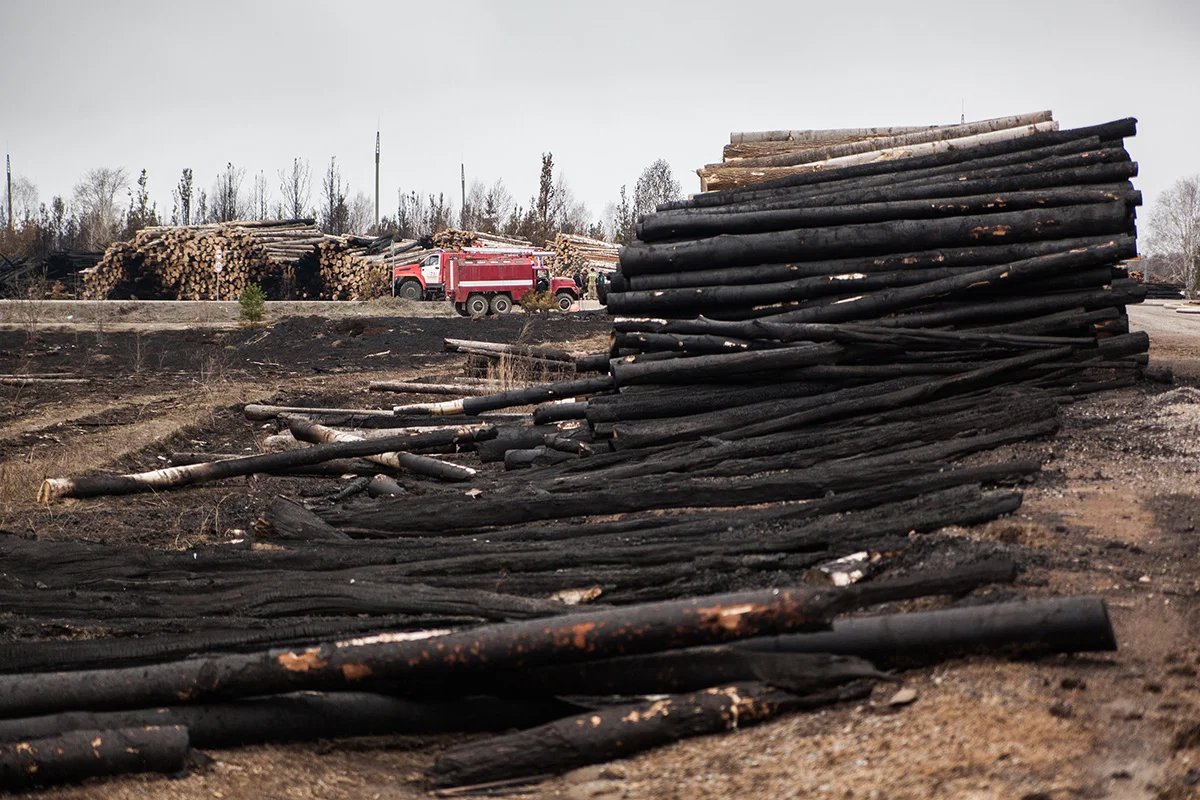
Burnt-down logs at a sawmill near the prison colony in Sosva. Photo: Nikolay Kozhevnikov, exclusively for Novaya Gazeta Europe
Locals say they had been complaining about the sawmills’ owners to the administration, but no serious measures were taken.
Fatalists
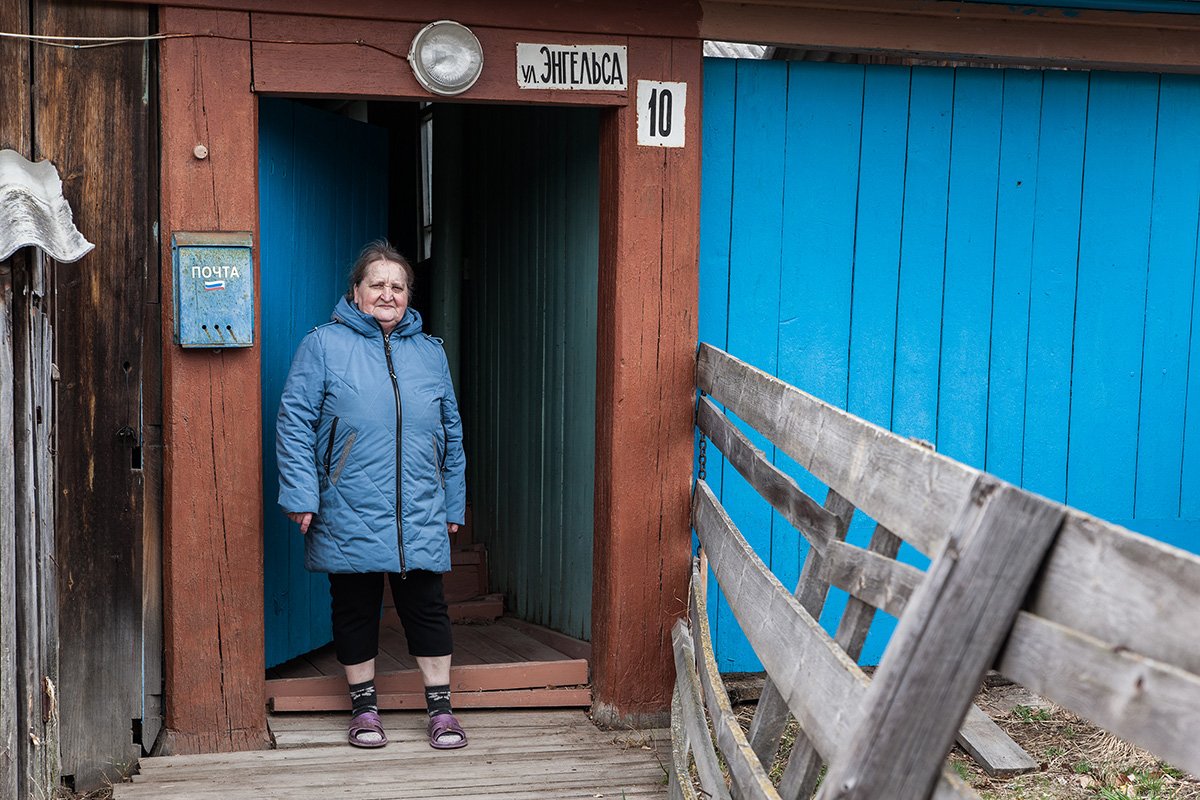
Olga Gulyayeva near her house. Photo: Nikolay Kozhevnikov, exclusively for Novaya Gazeta Europe
Olga Gulyayeva, 66, a maths teacher at the local school, took a taxi to the town’s centre on 25 April at noon to retrieve her escaped dog: it broke free of its chain a few days earlier, and then some local resident spotted her, tied her to a fence, and posted an announcement in a local social media group.
As Gulyayeva arrived at the location, she saw that people were rushing to pick up their kids from the local day-care as there was a huge plume of smoke nearby. Olga rushed back home to the other side of the town where there was no fire. As she was approaching her house, she heard a cracking sound: it was the roof slating of a house next to hers. A moment later, a pillar of fire appeared inside this building.
“How is that possible? It was minutes after the fire was on the other side of the town, and suddenly there’s fire in that house, although other houses nearby are not on fire at all,” Olga says.
It seems that most of the Sosva residents are fatalists. All of them rushed to their houses, but very few tried to save their belongings. Most only picked up their documents. Their children, however, did not hesitate to disconnect their PCs and to take their computers and monitors outside.
When asked why they didn’t try to retrieve other things from the house, Olga Gulyayeva says that she simply decided to “let it be”.
It was a sunny day, +18°C outside, and very windy, too.
When the fire started, posts that were used to support the power lines were destroyed, and electricity was cut off. The lack of power supply put electric pumps out of operation, meaning no water could be extracted from the wells.
“Any house the wind blew on would catch fire immediately. Our wooden houses would catch fire like matches. Five minutes in, and the house is but a pile of ash,” Gulyayeva says.
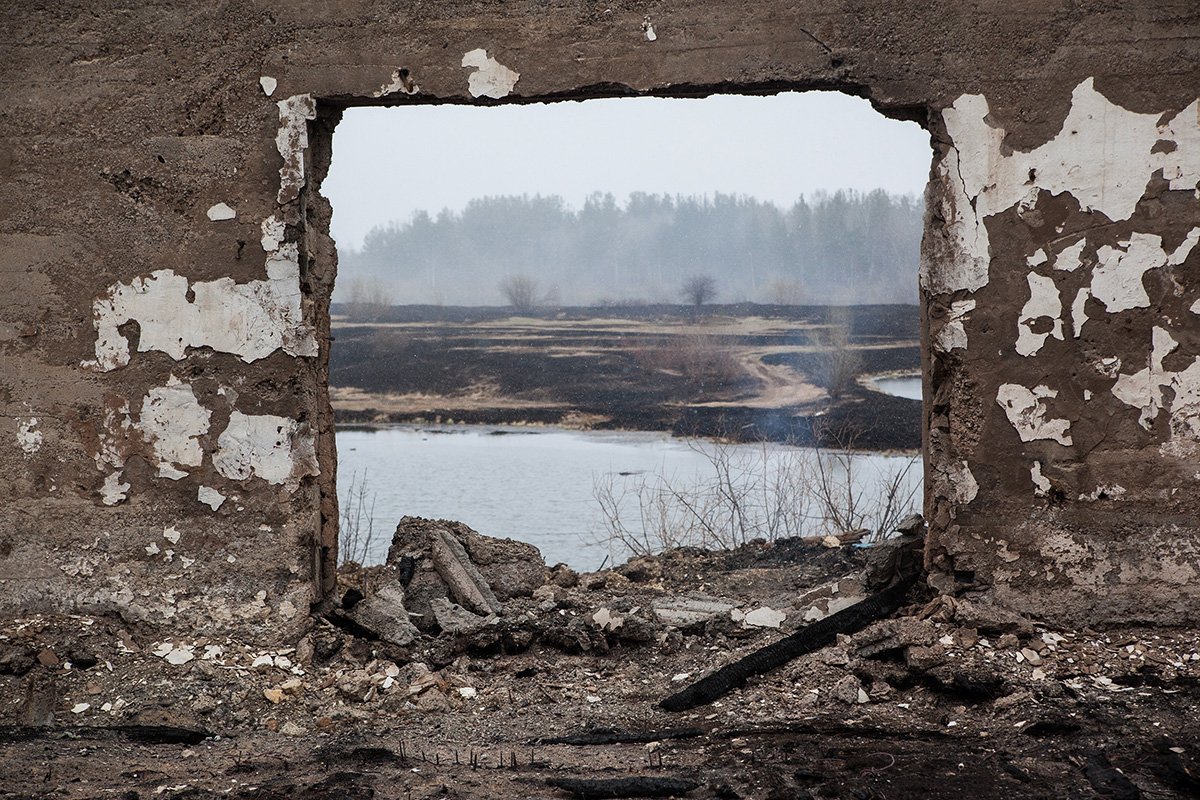
The view of the Sosva River from inside the former fire station of the local prison colony. Photo: Nikolay Kozhevnikov, exclusively for Novaya Gazeta Europe
The day before the fire started, Natalya Shcherbina took a glimpse outside her window and noticed that the location where sawmill workers were usually burning their waste had a plume of smoke over it. “They must be crazy to burn waste in windy weather like this,” she thought.
As the locals found out later, the fire started in the western part of the town, exactly where Shcherbina saw the smoke.
The fire went around the town and approached the prison colony. “Our colony was built ages ago, it is fully made of wood,” Lyubov Parshina says with reverence. The fire station, located 50 metres away from the prison itself, on the bank of the Sosva, went up in flames before long.
This is what it looked like in different parts of the town: some houses burned down completely, and some, built between the burned ones, were completely intact.
‘Old man, you’re on fire!’
Rimma Kalinina, 66, works as a janitor at a local school. When the fire started, her fellow villager Lida asked her: “If your house is not on fire, why don’t you come and help others put the fire out?”
As Kalinina was approaching her neighbour’s house, she noticed that the entrance hall of the house, where 85-year-old man Sasha lived, was on fire.
Rimma’s neighbour said: look, there’s a lock on his fence door, so he must be out somewhere. Kalinina approached the fence and saw that the lock was open. She rushed to the window immediately.
“So I see: the smoke is everywhere, and the old man is sleeping on his bed,” she recalls. “The entrance hall was on fire, so I couldn’t reach him that way.” Rimma asked a couple of blokes standing outside to help her, “but those didn’t move an inch, zero reaction”. “So then I kicked the window in and crawled into the house. He started yelling at me: “What are you up to, girl?” And I went: “Old man, you’re on fire!”
Rimma Kalinina is no taller than 5’2”, and Alexander Shatov, Sasha, is at least 6’3’’, according to Rimma’s words. He can barely walk on his own, and there was little time to think, so Rimma scooped up his documents and his photo album — she knew it was important as Sasha recently lost his wife, and had no one to look after him — and dragged the old man to the exit. This is when he recollected himself and shouted: “Wait up, girl! I got money in there!” “Where?” “Under the mattress”.
“So I had to crawl back,” Rimma says. “We managed to save the cash, it was wrapped in some rags out there”.
Rimma managed to drag her neighbour out of the house. All this time her other neighbour Lida was down on her knees near Sasha’s house with an icon, praying tearfully.
Rima says Lida also said a prayer in front of her own house.
“Believe it or not, but the neighbouring houses burned down to the ground, and hers remained intact”.
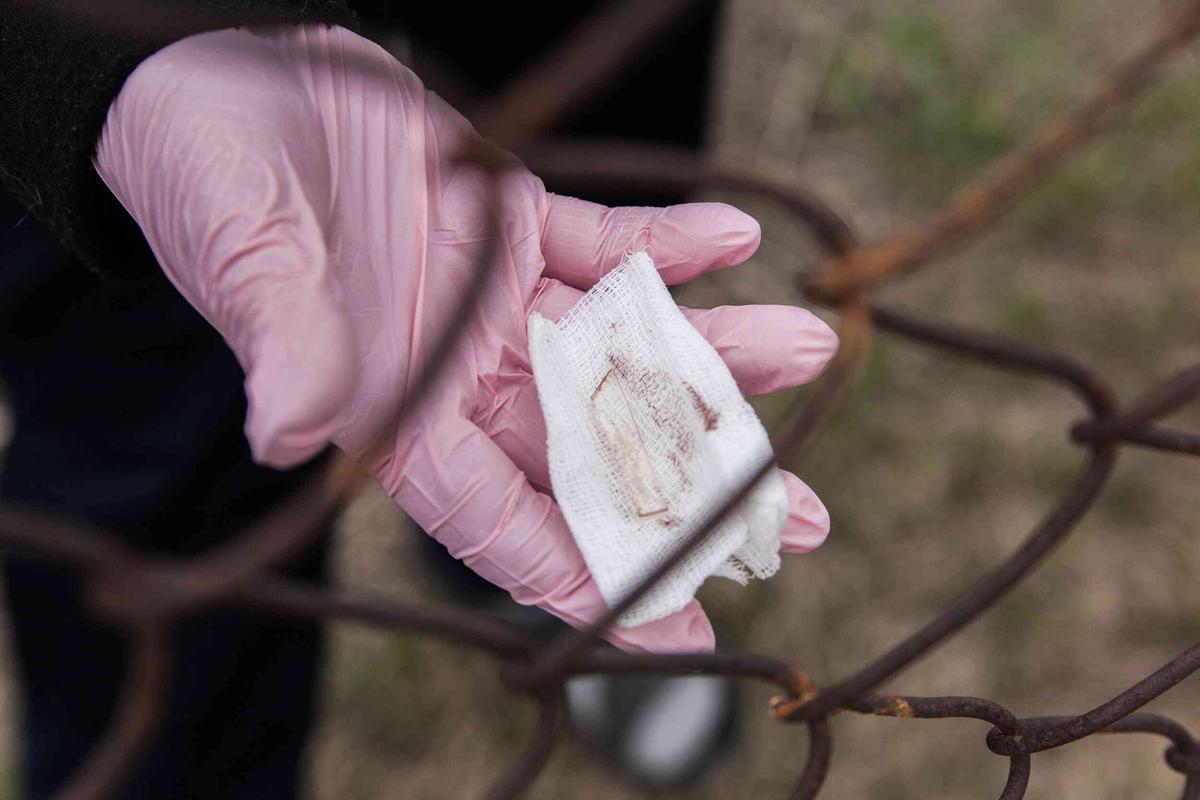
Rimma Kalinina showing a glass fragment she had removed from her leg. Photo: Nikolay Kozhevnikov, exclusively for Novaya Gazeta Europe
Rimma has been walking around for two days with a glass fragment stuck in her leg before she got to visit the local hospital to have it removed surgically.
“It didn’t really hurt,” she said after she rushed inside her house to fetch the removed fragment and showed it to me. “They gave me painkiller injections and removed it.”
‘This is my home. This is where I’ll die’
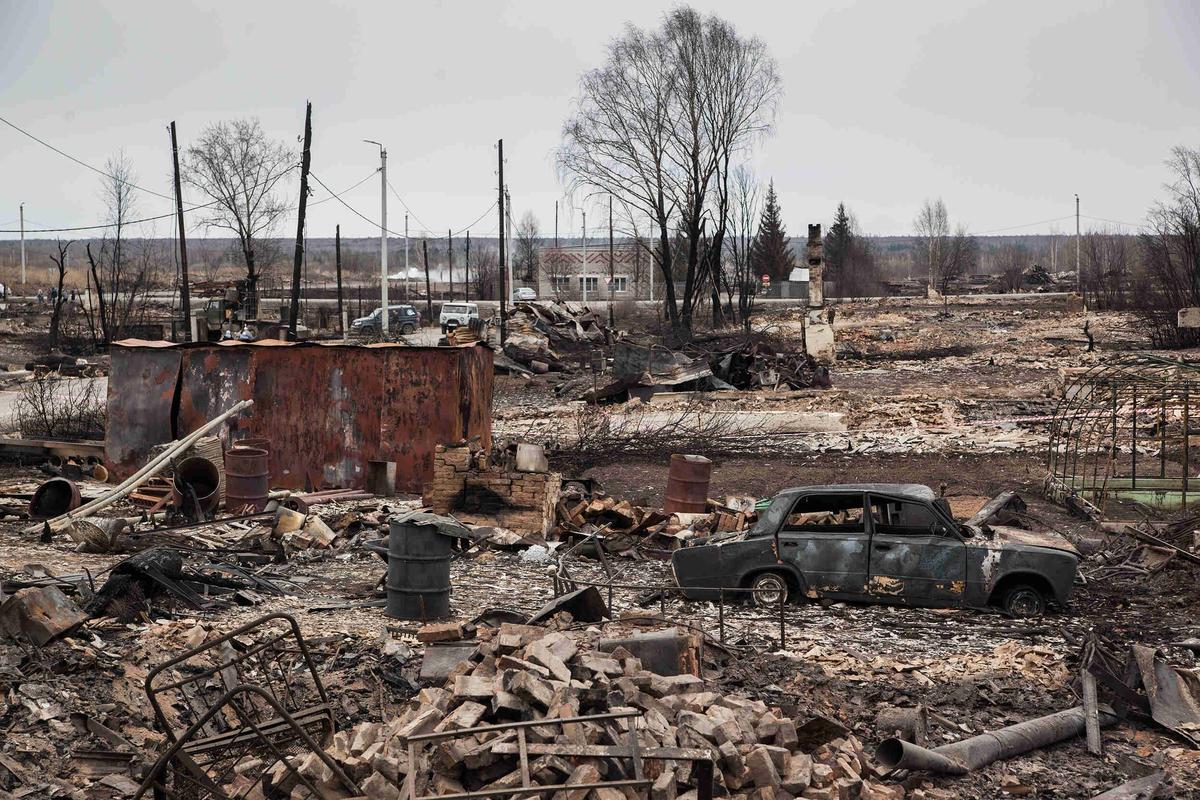
Sosva. Photo: Nikolay Kozhevnikov, exclusively for Novaya Gazeta Europe
A few hours after the fire had started, reinforcements arrived in Sosva, namely the Emergency Ministry helicopters, a firefighting train, and rescuers from neighbouring regions. They managed to more or less contain the fire by nightfall, although flames would break out in one location or another.
On the same night, the daughters of Tamara Alistratova, 90, arrived in the village. They had been calling their mother on their way to Sosva, but she never picked up her phone. Rescuers retrieved her dead body from under the rubble of her burnt down house in the morning.
A 62-year-old man also lost his life in the fire. People say that when the house was already in flames, he rushed inside, shouting: “This is my home. This is where I’ll die!”
The rescuers tried to stop him, but he managed to get inside anyway and died.
This very fire also destroyed the apartment of shop cashier Lyubov Parshina. As she arrived back home from the colony, her balcony was already on fire, and her German shepherd Linda had died in the flames. The woman picked up two of her cats, another dog, her documents, and escaped the burning house.
This fire killed many house cats that were hiding inside out of fear. Many dogs who were alone in their owners’ apartments or were tied outside were also killed by the fire, as were many chickens and pigs. The fire was spreading so fast that people had no time to open their cattle barns to let their animals out.
The ash
A grader lays flat what’s left of a house. Photo: Nikolay Kozhevnikov, exclusively for Novaya Gazeta Europe
On 30 April, graders laid flat what was left of houses, barns, and bathhouses. Waiting for the machinery to arrive, people would wander around their plots of land, peering into the burnt down ground, hoping to find something that survived the fire. The ground was still smouldering, and the smoke was in the air.
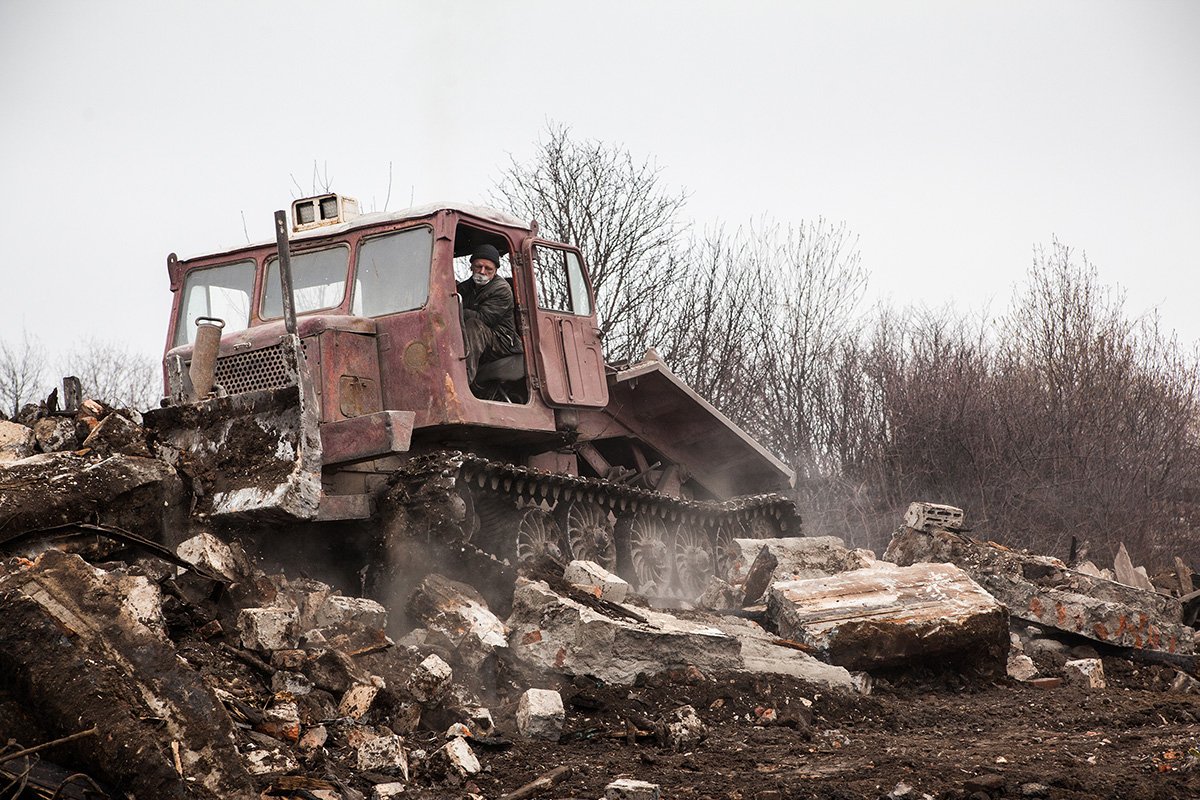
Inside a destroyed house. Photo: Nikolay Kozhevnikov, exclusively for Novaya Gazeta Europe
“They need to be in prison,” says Ivan Chernov, a local resident, about the town’s firefighters.
I speak to him near the place where his home once was. When the fire started, Chernov was at work.
He works as a driver, but his boss did not let him use his work vehicle to get to his house. This is why Ivan had to run back home. When he finally made it there, the house was already in flames. Ivan managed to save his documents and to push his broken car out of the garage. A few minutes after, everything on his plot of land was ash.
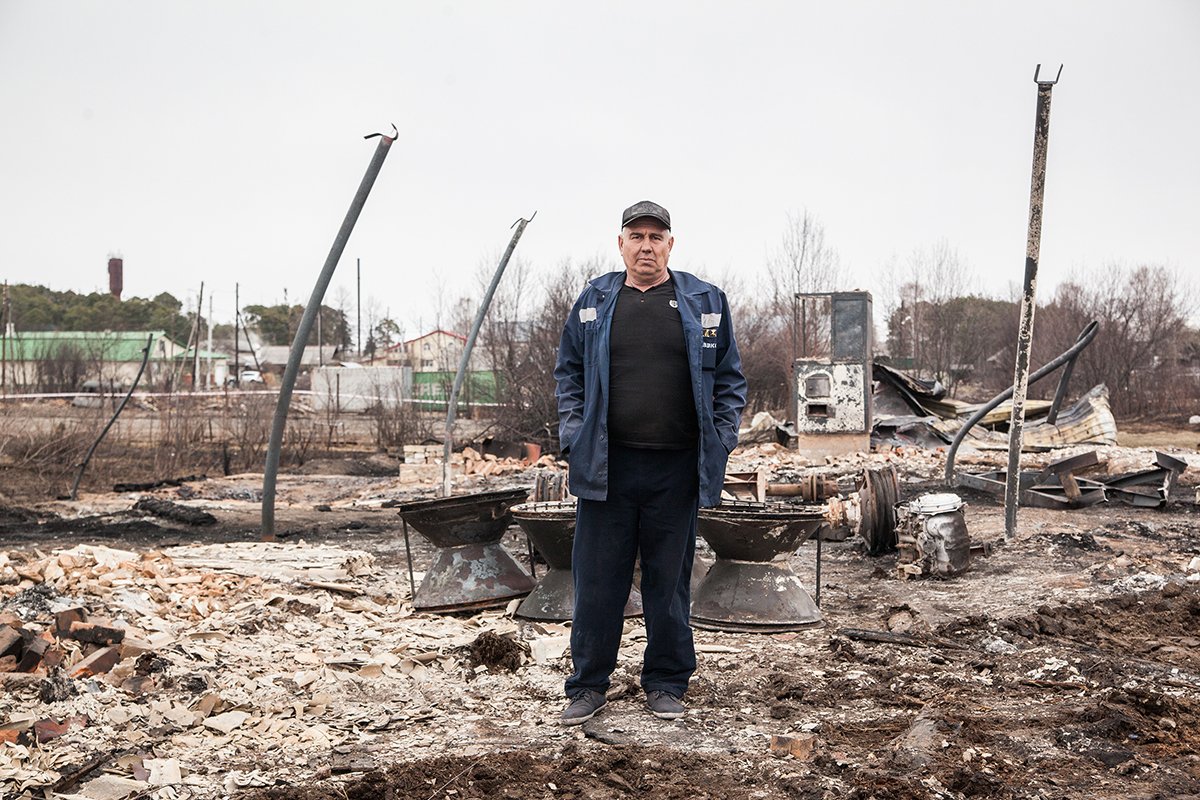
Ivan Chernov, near the place where his house once stood. Photo: Nikolay Kozhevnikov, exclusively for Novaya Gazeta Europe
“The fire truck arrived, stood there for a couple of minutes, and left,” Chernov recalls. “They did not even try to extinguish the house. The firefighter said: ‘What am I to do? I’m the only driver, and I’m assigned to two fire trucks.’ And that’s it.”
“The firefighters were only eager to extinguish the colony. Why the hell would they need to extinguish it, there was no one inside? While they were extinguishing the colony, the entire town was burned down in the fucking fire. Firefighters, my ass.”
A grader behind Ivan Chernov’s back is levelling his house with the ground. Chernov is still wearing the same clothes he put on as he left for work on the day of the fire. He has nothing else to wear. A friend of his let him stay for a few months. Ivan has no idea what to do next.
‘Nixon failed’
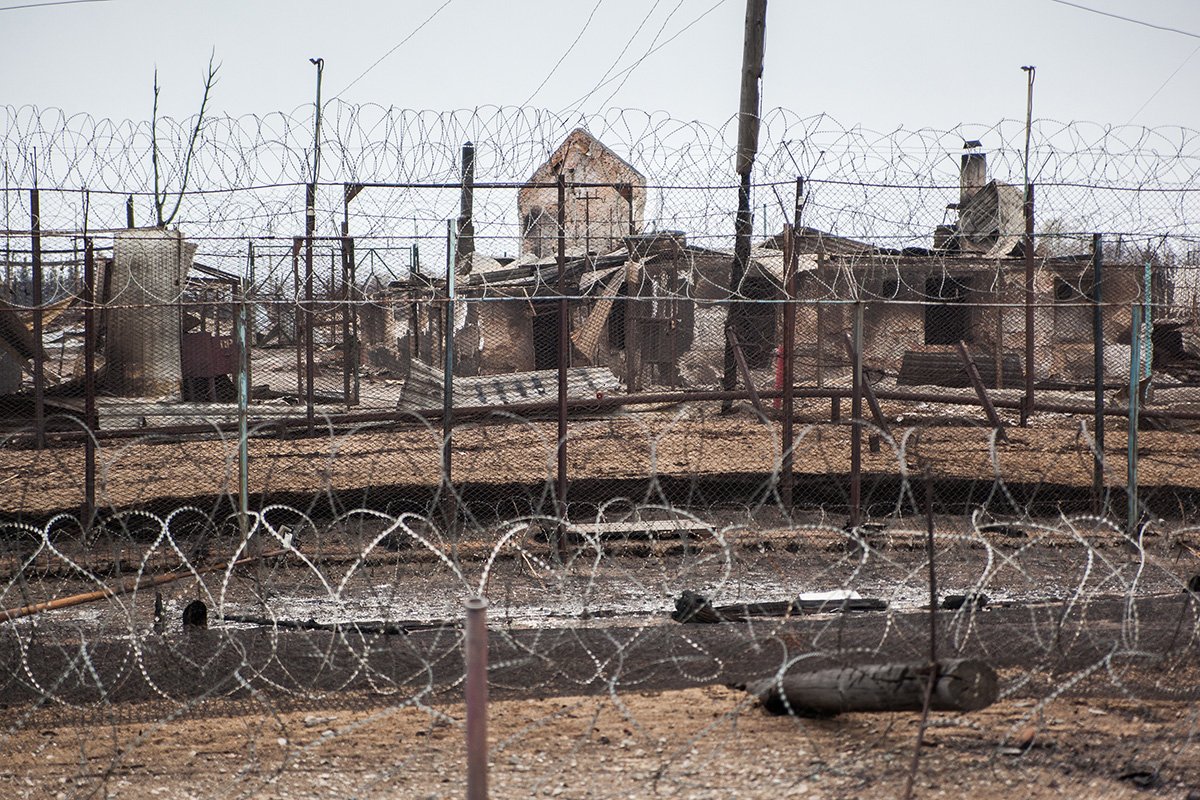
The prison colony. Photo: Nikolay Kozhevnikov, exclusively for Novaya Gazeta Europe
On 27 April, the Investigative Committee detained two men allegedly to blame for the fire: Vyacheslav Alekseev, 40, a local administration employee in charge of fire safety, and 29-year-old sawmill manager Gazanfar Mamedov. Alekseev has been charged with violating fire safety regulations and mismanagement resulting in the death of two people. Mamedov has been charged with destroying and damaging property through negligence and violating fire safety regulations.
The latter denies his guilt, claiming that the owner of another sawmill is to blame.
The local officials have calculated that a total of 130 houses burned down in the fire; more than 600 local residents lost their homes. However, Sosva is still piled up with garbage, including new cigarette ends and empty vodka bottles. The dry grass, wood shavings and bars are also still there.
Gennady Makarov, the head of the local administration, told me his colleagues would answer all my questions.
I arrived at the town hall to ask them if they saw fire-hazardous litter all over the place, and if locals complained about the sawmills. The local clerks came to the lobby, shifting from foot to foot, pointing fingers at each other: “Maybe she can answer your question?” It turned out the wind was to blame: “It’s force of nature, what can you do.” They also told me none of the locals ever complained about anything, and now they are “very glad” about the aid the local authorities provide.
After four days, Makarov actually resigned.
The town hall paid out 10,000 rubles (€120) to the local residents. They do not want to leave Sosva, hoping that the colony would be rebuilt, and they would get their jobs back. This is the only thing people talk about in Sosva these days.
The officials offer two options to the families whose houses burned down: they can either move into an apartment block, scheduled to be finished by the end of autumn; for those who lived in a detached house, a generic modular house can be erected on the site of the burnt one.
But people here do not trust the authorities. They know how things ended up with people who suffered such a disaster before. So, for now the locals have moved to live with their family members elsewhere.
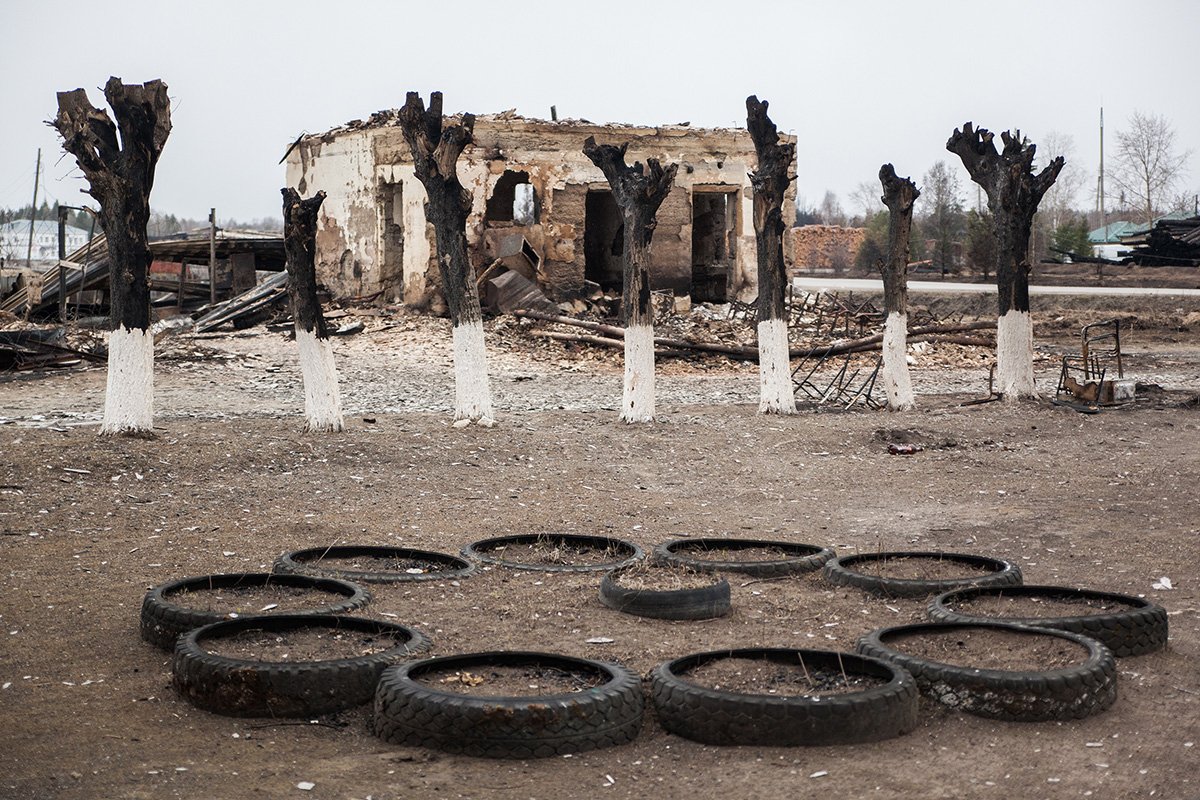
Sosva after the fire. Photo: Nikolay Kozhevnikov, exclusively for Novaya Gazeta Europe
In a small eatery located near the entrance to Sosva, a TV talking head says in a typical concerned tone: “Reaganomics has grown weary. The US national debt has surpassed all acceptable limits. Nixon has failed.” Olga Vershinina, 40, a mother of three children, is standing behind the counter, wearing a white apron.
Olga lost her house in a fire three years ago, also during springtime. Her husband and daughter only just managed to escape the house barefoot while Olga was at work.
Since then, she has been visiting the local town hall, asking for help almost every day.
Each time she comes, a clerk tells her: “The hell am I supposed to do? We have no vacant housing.” The town hall gave her a 10,000 rubles payout back then, and she also received social welfare worth 30,000 (€360).
Vershinina used to rent an apartment for 10,000, while her monthly salary is 15,000; she is a cook and a manager at the local eatery. Vershinina’s husband is the breadwinner of the family, he is a tractor driver at the local logging camp.
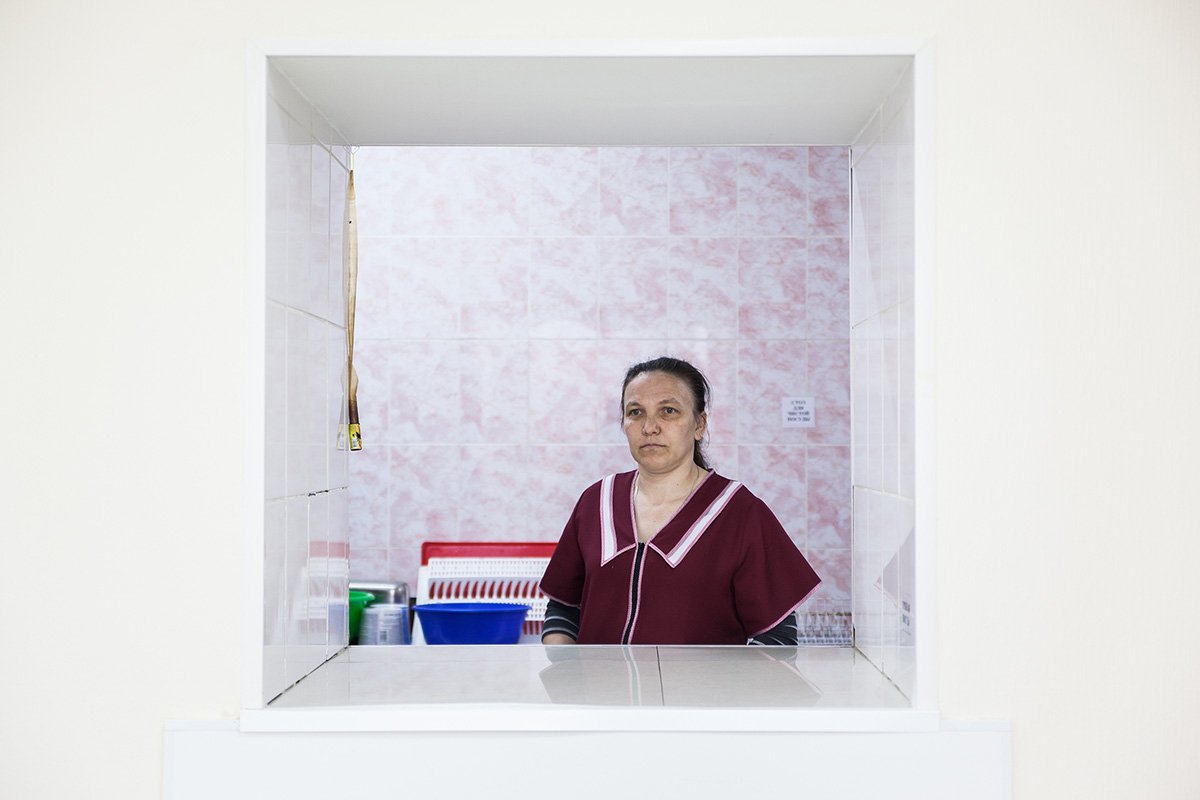
Olga Vershinina at work. Photo: Nikolay Kozhevnikov, exclusively for Novaya Gazeta Europe
In April 2023, she was again told to collect documents in order to renew her status, confirming that she still needed housing.
“As if something has changed about my situation,” she says. “I had to collect the papers for my 9-year-old child again to prove he owns no real estate”.
***
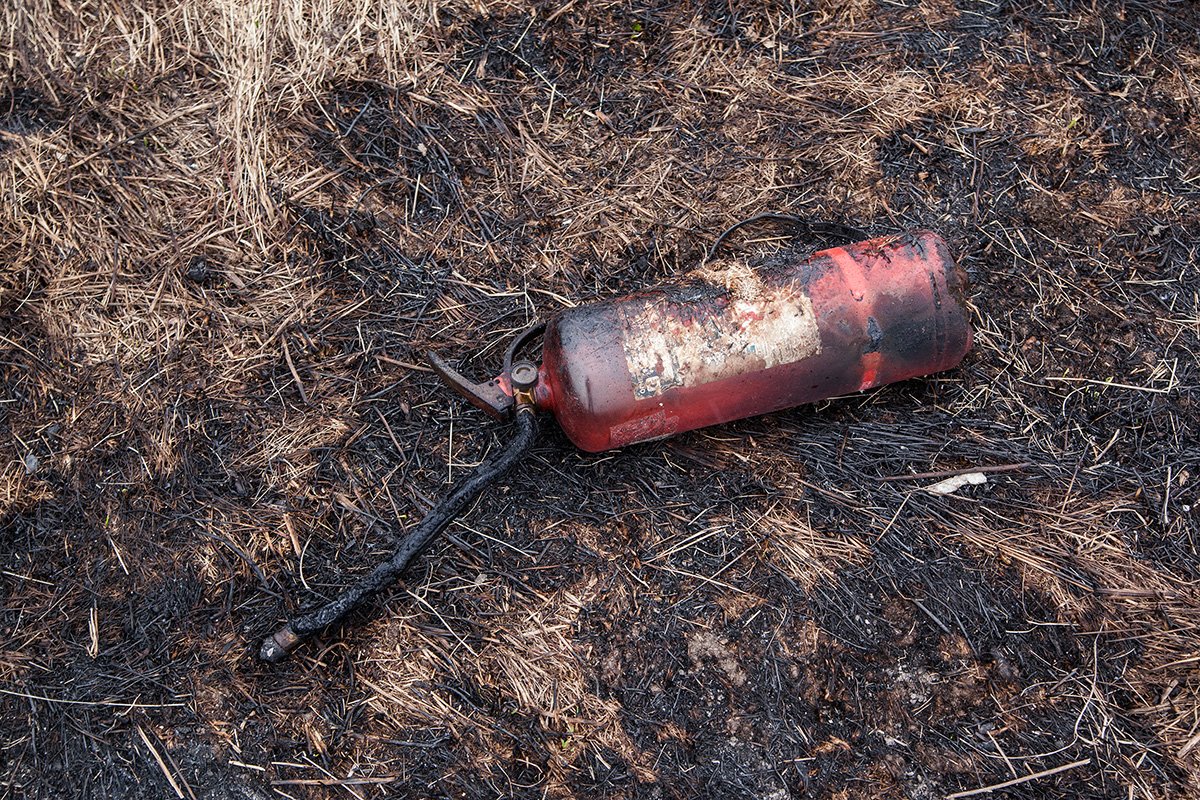
Sosva. Photo: Nikolay Kozhevnikov, exclusively for Novaya Gazeta Europe
Olga Zhukova, 62, is also standing on the spot where her house once was. All that’s left is a crater and a cast iron bath.
“We used to have a two-storey house. On the ground floor we had a bathroom, a stockroom, and a kitchen. Upstairs we had a room for each family member. The living quarters alone were 89 square metres. What they offer us now is only 80 square metres for everything,” she complains. “By the number of registered individuals. There were six of us before, but one of my sons was killed in the war,” she says casually. “Now there are five of us. What sort of housing do they have for five people? Are we going to sleep on top of each other? How many square metres are we going to have?”
Olga casually mentions that both of her sons went to war last summer, even before the mobilisation was declared. The elder son said last June: “Mum, I’m gonna go there.” His wife was begging Olga: “Tell him not to go there.”
“What am I supposed to tell him? He’s a grown-up man. If he made up his mind, that’s it,” she concludes. “He has a degree and used to work at a construction site. Then he found a rotation job in Moscow. He was neither a drinker nor a smoker, he was a breadwinner for his family. As it should be.”
Olga buried one of her sons around New Year’s Eve. Her second son is waiting for her in the car. He came home to recover from a bullet and shrapnel wound, and will soon leave for the combat zone again. But Olga is more worried about other things these days.
Join us in rebuilding Novaya Gazeta Europe
The Russian government has banned independent media. We were forced to leave our country in order to keep doing our job, telling our readers about what is going on Russia, Ukraine and Europe.
We will continue fighting against warfare and dictatorship. We believe that freedom of speech is the most efficient antidote against tyranny. Support us financially to help us fight for peace and freedom.
By clicking the Support button, you agree to the processing of your personal data.
To cancel a regular donation, please write to [email protected]
